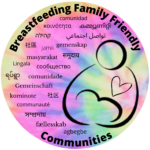In our journey towards nurturing inclusive communities, the Breastfeeding Family Friendly Communities (BFFC) initiative champions the critical importance of comprehensive lactation support, with a special focus on the invaluable role of peer-to-peer connections. This advocacy is deeply informed by the compelling insights from Hilary K. Brown, PhD, and Yona Lunsky, PhD, concerning the breastfeeding, chestfeeding, and human milk feeding experiences of individuals with disabilities. Their research highlights the urgent need for health surveillance and lactation support systems to inclusively address the challenges and disparities faced by lactating individuals with disabilities.
The work by Brown and Lunsky, ‘Time to Count the Breastfeeding Experience of Women with Disabilities in Health Surveillance Efforts.’ serves as a crucial reminder of the diversity within the lactation community (request a free copy). It shows that, although individuals with disabilities initiate breastfeeding at rates similar to their peers without disabilities, significant disparities in breastfeeding duration persist. This underscores the necessity for tailored support that recognizes and accommodates the unique obstacles encountered by lactating parents with disabilities.
At BFFC, we believe peer-to-peer support is foundational in fostering breastfeeding-friendly environments. The power of shared experiences and mutual learning among peers is unparalleled. For individuals with disabilities, this support is particularly vital, offering not just practical advice and emotional support, but also a sense of community and belonging. Peer support is more than just exchanging information; it’s about creating a space where every breastfeeding parent feels seen, heard, and valued.
Navigating the complexities of newborn care and lactation is a universal challenge that is often intensified for individuals with disabilities. The range of experiences—from the physical difficulties of chest/breastfeeding with a mobility impairment to the sensory challenges faced by parents who are blind, deaf, or autistic—highlights the diverse needs within the community. Despite these challenges, the determination and resilience of parents with disabilities in their lactation journey are profound, reflecting their deep love and commitment to their children.
Recognizing the need for specialized lactation support for individuals with disabilities is just one aspect of BFFC’s advocacy. We aim for a holistic approach to inclusivity, acknowledging and addressing the varied needs of all families. The saying “a rising tide lifts all ships” beautifully captures our ethos, yet it’s essential to recognize that not all families begin from the same vantage point. Achieving equity in lactation support requires a customized approach that respects the unique journeys and challenges of each family.

